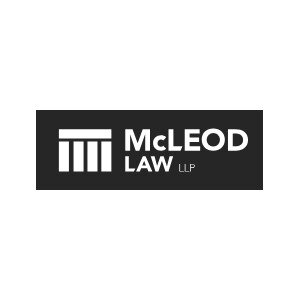Best Restructuring & Insolvency Lawyers in Calgary
Share your needs with us, get contacted by law firms.
Free. Takes 2 min.
List of the best lawyers in Calgary, Canada
About Restructuring & Insolvency Law in Calgary, Canada
Restructuring and insolvency law in Calgary, Canada, addresses situations where individuals or businesses are facing significant financial difficulties. This area of law provides options for debt relief, business restructuring, and creditor protection within the legal frameworks established by federal and provincial statutes. Calgary’s robust economy and thriving business community make restructuring and insolvency an ever-relevant aspect of legal practice, affecting both companies facing operational hardships and individuals overwhelmed by debts.
Legal processes in this field can include reorganizing debts, liquidating assets, negotiating with creditors, and sometimes overseeing the complete wind-up of a business. Whether you are looking to protect your interests as a debtor or creditor, understanding your rights and obligations under restructuring and insolvency law is essential.
Why You May Need a Lawyer
Legal advice is crucial in restructuring and insolvency matters due to their complex and often time-sensitive nature. You may consider consulting a lawyer if you are:
- Struggling to manage personal or business debts
- Facing pressure from creditors or collection agencies
- Exploring options to restructure your business or avoid bankruptcy
- Trying to recover money owed as a creditor
- Considering filing for bankruptcy or a consumer proposal
- Dealing with insolvency-related litigation or disputes
- Wanting to understand the legal implications of liquidation, receivership, or court orders
- Seeking to protect key business assets or personal property
An experienced restructuring and insolvency lawyer in Calgary can provide you with clear guidance, help you evaluate your legal options, and ensure compliance with all local and federal regulations.
Local Laws Overview
Restructuring and insolvency issues in Calgary are governed primarily by Canadian federal laws, but provincial statutes and local business practices also play significant roles. Key legal frameworks include:
- Bankruptcy and Insolvency Act (BIA): The main federal statute governing bankruptcy, proposals, and receiverships for individuals and businesses.
- Companies’ Creditors Arrangement Act (CCAA): Applies to larger companies looking to reorganize their finances under court supervision.
- Personal Property Security Act (PPSA) Alberta: Governs the registration and enforcement of security interests in personal property within Alberta.
- Alberta’s Civil Enforcement Act: Addresses how creditors may enforce judgments within the province.
Local courts, such as the Court of King’s Bench of Alberta (Calgary), handle many restructuring and insolvency matters. The rules and procedures in these courts can be technical, so seeking professional legal guidance is strongly recommended.
Frequently Asked Questions
What is the difference between bankruptcy and restructuring?
Bankruptcy typically involves liquidating assets to pay off creditors, leading to the end of the business or a discharge of personal debts. Restructuring focuses on reorganizing debts and operations to allow a company or individual to continue functioning while addressing financial difficulties.
Can I keep my home if I go bankrupt in Calgary?
Certain exemptions under Alberta law may allow you to keep some assets, including a portion of the equity in your home. The specifics depend on your individual case and should be discussed with a legal professional.
What are my options if my business is insolvent?
Options include filing for bankruptcy, proposing a formal payment arrangement with creditors, pursuing business restructuring under the CCAA, or seeking receivership. The best path forward depends on your business size, debts, and long-term goals.
How does a consumer proposal work?
A consumer proposal is a legal process that allows individuals to negotiate a repayment plan with creditors, typically for a portion of the debt owed, spread over up to five years. It must be managed by a Licensed Insolvency Trustee.
What is the role of a Licensed Insolvency Trustee?
Licensed Insolvency Trustees (LITs) are government-regulated professionals who administer bankruptcy and proposal processes, ensuring compliance with the law and fairness to all parties involved.
How are creditors affected by insolvency proceedings?
Creditors’ rights may be limited by a stay of proceedings, meaning collection actions are paused. Creditors may have the opportunity to participate in meetings, vote on proposals, and make claims against the assets of the debtor.
What happens to employees during a business insolvency?
Employees may be terminated, retained, or temporarily laid off depending on the business restructuring or liquidation plan. Some claims, such as unpaid wages, have priority under the law up to specified limits.
Can I file for bankruptcy without a lawyer?
Filing for bankruptcy requires working with a Licensed Insolvency Trustee. While a lawyer is not required, legal advice is often recommended to help understand your rights, obligations, and implications for your specific situation.
How long does the bankruptcy process take in Calgary?
For most first-time bankruptcies, the process can be completed in as little as nine months, but it may take longer for more complicated cases or repeat filings.
What are the consequences of bankruptcy on my credit history?
Bankruptcy will appear on your credit report for a period of six to seven years for a first bankruptcy. This can make obtaining new credit more challenging during that time.
Additional Resources
For more information and assistance on restructuring and insolvency matters in Calgary, consider contacting or consulting the following organizations:
- Office of the Superintendent of Bankruptcy Canada (OSB)
- Alberta Courts, Civil Division
- Licensed Insolvency Trustees (a directory is available through the OSB)
- Consumer Protection Alberta
- Calgary Legal Guidance
- Alberta Law Society Referral Service
- Canadian Association of Insolvency and Restructuring Professionals (CAIRP)
Next Steps
If you are facing financial difficulties or have questions about restructuring and insolvency in Calgary, the following steps can help guide your path forward:
- Assess your financial situation and gather all relevant documents
- Seek initial advice from a Licensed Insolvency Trustee or a qualified lawyer specializing in restructuring and insolvency
- Understand all available options, including bankruptcy, proposals, restructuring, or alternative debt relief solutions
- Contact local resources or legal assistance organizations for further support
- If appropriate, engage a lawyer to represent your interests and guide you through court proceedings, negotiations, or legal filings
Timely action and expert legal support can make a significant difference in protecting your interests and ensuring the best possible outcome in restructuring and insolvency matters.
Lawzana helps you find the best lawyers and law firms in Calgary through a curated and pre-screened list of qualified legal professionals. Our platform offers rankings and detailed profiles of attorneys and law firms, allowing you to compare based on practice areas, including Restructuring & Insolvency, experience, and client feedback.
Each profile includes a description of the firm's areas of practice, client reviews, team members and partners, year of establishment, spoken languages, office locations, contact information, social media presence, and any published articles or resources. Most firms on our platform speak English and are experienced in both local and international legal matters.
Get a quote from top-rated law firms in Calgary, Canada — quickly, securely, and without unnecessary hassle.
Disclaimer:
The information provided on this page is for general informational purposes only and does not constitute legal advice. While we strive to ensure the accuracy and relevance of the content, legal information may change over time, and interpretations of the law can vary. You should always consult with a qualified legal professional for advice specific to your situation.
We disclaim all liability for actions taken or not taken based on the content of this page. If you believe any information is incorrect or outdated, please contact us, and we will review and update it where appropriate.















